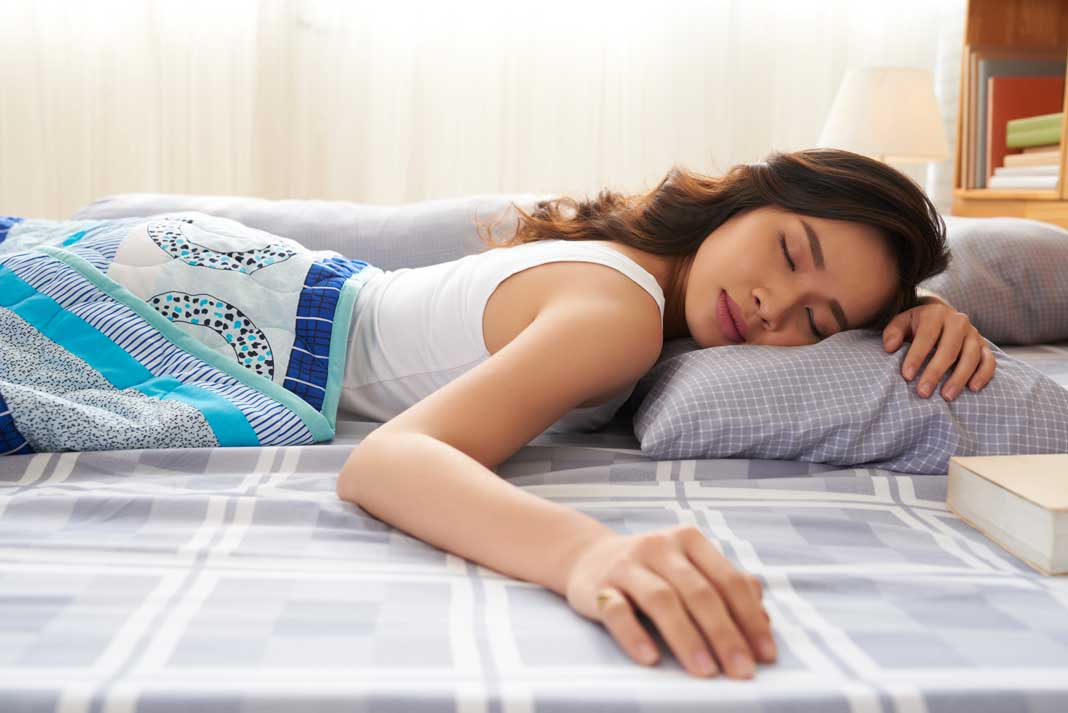Sleep plays a critical role in providing us with good physical health and mental well-being throughout life.
Most of us are not getting enough quality sleep at night, and this leads to a host of health issues. Such as mental health problems, physical health ailments, quality of life problems, and personal safety issues. When you get a quality night’s sleep it allows your brain to cleanse itself. Which helps to maintain healthy brain function – this in return affects a healthy mind and body.
We have compiled a list of 5 simple tips to getting better sleep. We encourage you to follow these 5 simple steps for better sleep hygiene. If you follow our simple sleep tips; we’re certain your sleep will improve.
Avoid Taking Naps During The Day
 For most people, the practice of taking short naps will not generally affect the quality of your overall nighttime sleep. However, if you experience insomnia or your sleep quality at night is poor, then napping during the day might worsen your sleep issues. For the most part, long or frequent naps during the day might overall interfere with the quality of nighttime sleep you achieve. So, if you are short-term napping during the day and you notice it’s causing you nighttime sleep issues. It’d then be best to avoid those naps.
For most people, the practice of taking short naps will not generally affect the quality of your overall nighttime sleep. However, if you experience insomnia or your sleep quality at night is poor, then napping during the day might worsen your sleep issues. For the most part, long or frequent naps during the day might overall interfere with the quality of nighttime sleep you achieve. So, if you are short-term napping during the day and you notice it’s causing you nighttime sleep issues. It’d then be best to avoid those naps.
Get on a Healthy Sleep Schedule
 Getting on a good healthy sleep schedule and sticking to that sleep schedule can help you achieve a better-quality night’s sleep. A sleeping schedule where you stick to the same bedtime and wake up times, even on the weekends could greatly improve your sleep. Getting into the habit of following a sleep schedule helps you to regulate your body’s clock. Thus, helping you fall asleep and stay asleep throughout the night.
Getting on a good healthy sleep schedule and sticking to that sleep schedule can help you achieve a better-quality night’s sleep. A sleeping schedule where you stick to the same bedtime and wake up times, even on the weekends could greatly improve your sleep. Getting into the habit of following a sleep schedule helps you to regulate your body’s clock. Thus, helping you fall asleep and stay asleep throughout the night.
Design an Inviting Sleep Environment
 Evaluate your bedroom. Is it designed to provide you with the optimal environment you need to establish the best conditions for a good night’s rest? Your bedroom should be cool yet inviting. Ideal room temperature for sleep is between 60 and 67 degrees. Your bedroom should also be quiet and dark so that there are minimal distractions that can disturb your sleep. Sleep aids to consider using include – blackout curtains, sleeping mask, sleeping earplugs, natural sleep aids or a “white noise” machine.
Evaluate your bedroom. Is it designed to provide you with the optimal environment you need to establish the best conditions for a good night’s rest? Your bedroom should be cool yet inviting. Ideal room temperature for sleep is between 60 and 67 degrees. Your bedroom should also be quiet and dark so that there are minimal distractions that can disturb your sleep. Sleep aids to consider using include – blackout curtains, sleeping mask, sleeping earplugs, natural sleep aids or a “white noise” machine.
Slow Down, Calm Down and Wind Down for Better Sleep
 For you to have your best chance at getting a decent night’s sleep your body needs a little time to switch gears from awake mode to sleep mode. So, getting into a good bedtime ritual of slowing down, calming down and winding down for sleep is critical. To do this try spending some time engaging yourself in a calming activity such as reading, meditation or something along those lines. Make sure to stay away from using any electronic devices such as a cell phone, tablet or personal computer an hour or two before heading to bed. The reason to avoid these types of devices before bed is that they emit a type of light from their screens that activate the brain – thus, making it hard for you to fall asleep and stay asleep.
For you to have your best chance at getting a decent night’s sleep your body needs a little time to switch gears from awake mode to sleep mode. So, getting into a good bedtime ritual of slowing down, calming down and winding down for sleep is critical. To do this try spending some time engaging yourself in a calming activity such as reading, meditation or something along those lines. Make sure to stay away from using any electronic devices such as a cell phone, tablet or personal computer an hour or two before heading to bed. The reason to avoid these types of devices before bed is that they emit a type of light from their screens that activate the brain – thus, making it hard for you to fall asleep and stay asleep.
Use Light and Exercise to Your Advantage
 Vigorous physical exercise is best, as the activity improves our sleep quality and increases sleep duration, as it tires our bodies out. That being said, if you’re unable to do physical exercise any exercising can greatly help your overall sleep hygiene. Exercising daily is very beneficial. Especially, if you’re able to exercise outdoors where your body can soak up the natural sunlight during the daytime hours. Exposure to bright natural sunlight or even artificial Sunlamps can help you manage your circadian rhythms. It’s best to avoid bright light and exercise in the evening a couple of hours before your bedtime. As doing so will keep your circadian rhythms in check; allowing you to achieve a better night’s sleep.
Vigorous physical exercise is best, as the activity improves our sleep quality and increases sleep duration, as it tires our bodies out. That being said, if you’re unable to do physical exercise any exercising can greatly help your overall sleep hygiene. Exercising daily is very beneficial. Especially, if you’re able to exercise outdoors where your body can soak up the natural sunlight during the daytime hours. Exposure to bright natural sunlight or even artificial Sunlamps can help you manage your circadian rhythms. It’s best to avoid bright light and exercise in the evening a couple of hours before your bedtime. As doing so will keep your circadian rhythms in check; allowing you to achieve a better night’s sleep.
Try to incorporate one of these sleep tips daily until you manage to include them all into your Sleep Routine. We hope that these sleep tips help you get a better night’s sleep – sweet dreams.





